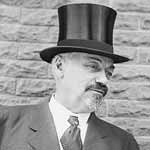Thornton, who was always quick witted and full of charm, instantly replied: “My darling, I love as I loved you when you were sweet 16.
James Thornton
Songwriters main page
Later, he realised this would be a good title for a song and set about creating what was to become his most popular song.
It’s a good story, of course, but it has to be tempered by the fact that there are similar stories about some of Thornton’s other songs, such My Love’s The Man in the Moon.
When You Were Sweet 16 sold for $15

When You Were Sweet Sixteen was first published in 1898 and was an instant success.
It was performed in music halls all over America by Bonnie and many of the popular vaudeville artists of the day. It’s not clear how much money Thornton would have made out of the song.
In those days, songwriters earned most of their money from the royalties on the sale of sheet music.
Sales could be slow and royalty payments from publishers could be even slower. To counter this, it appears that Thornton may have sold the song outright to a publisher for just $15.
Publishers in dispute over When You Were Sweet 16
It may even be that Thornton sold the song to two or more publishers. This came to light after the song became successful all across America and started earning considerable sums in sheet music sales.
One of the publishers, Stern and Marks, discovered that a rival publisher Witmark was also selling the song. They sued and were able to produce evidence that they had paid Thornton $15 for it. After much legal wrangling and negotiations, Witmark eventually paid Stern $5,000 for the song – a huge sum in those days.
Thornton marries again after death of Bonnie
Thornton’s beloved wife Bonnie, the inspiration for some of his best songs, died in March 1920.
In December of the same year, Thornton remarried. His new wife was Josephine Boyle, a restaurateur in New York. Thornton was 59 at the time and Boyle, who was a divorcee and marrying for the third time, was 46.
Thornton continued to perform in vaudeville after Bonnie’s death but he was now in the twilight of his career and his appearances became less frequent.
Thornton gave up songwriting as public taste changed
Thornton gave up writing songs towards the end of the 1920s as public taste began to change. The success of songs like Yes We Have No Bananas made him feel out of touch with the public.
He was quoted in the New York Times saying: “When those things click, I don’t know anything.”
Thornton died at his home in New York in 1938 after an illness of 15 months. He was 76.
Performing for three generations of Hammersteins

The New York Times obituary described how Thornton’s career spanned 50 years. During that time he had performed for three generations of the Hammerstein showbiz impresario family.
He appeared at Oscar Hammerstein’s New York Theatre, Willie Hammerstein’s Victoria Theatre and he also appeared in Arthur Hammerstein’s major spectacle Sweet Adeline in 1929.
However, it is for When You Were Sweet Sixteen that he is now best remembered.
James Thornton
Dispute caused by classic song
Songwriters main page
